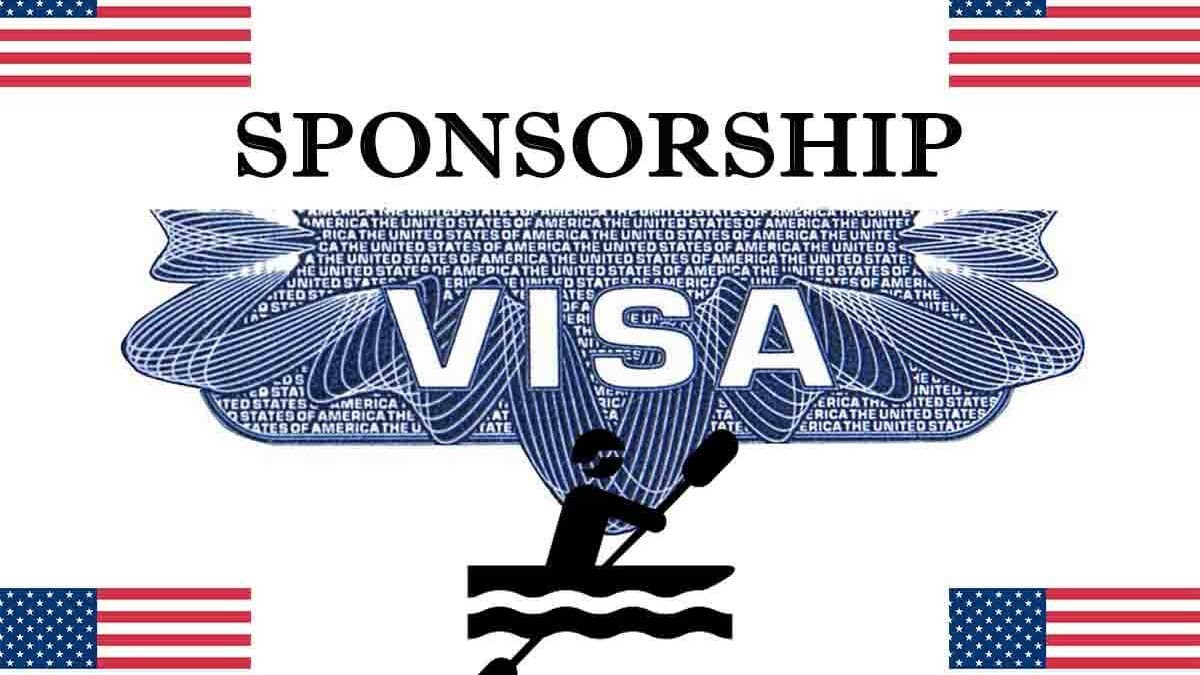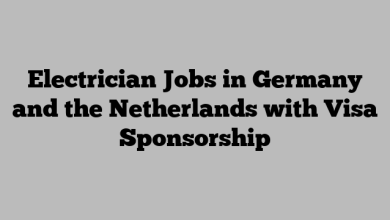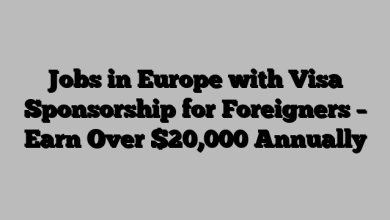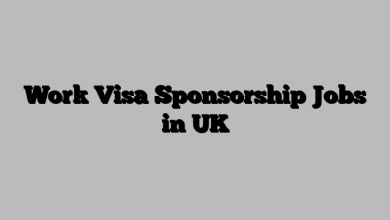$90,000 United State Visa Sponsorship Opportunities in 2025 – Submit Application Now

The United States remains one of the most sought-after destinations for individuals seeking better career opportunities, education, and quality of life.
In 2025, numerous visa sponsorship opportunities are available for those looking to migrate to the U.S. through employment, study, or investment.
This article provides a detailed guide on various visa sponsorship options, eligibility requirements, application processes, and key industries actively sponsoring foreign talent.
Understanding Visa Sponsorship
Visa sponsorship is when a U.S. employer, educational institution, or family member supports an individual’s visa application to legally enter and stay in the country.
The sponsor typically files a petition with the U.S. Citizenship and Immigration Services (USCIS) on behalf of the applicant, covering legal and financial responsibilities.
Types of Visa Sponsorships
Visa sponsorship in the U.S. falls under different categories, primarily employment-based, family-based, and investment-based visas.
1. Employment-Based Visa Sponsorship
Employment-based visa sponsorship is one of the most common ways to legally work in the U.S. It requires an employer to file a petition on behalf of the applicant.
H-1B Visa (Specialty Occupations)
- The H-1B visa is designed for highly skilled professionals in fields such as IT, engineering, finance, medicine, and education.
- Requires a job offer from a U.S. employer who will file Form I-129.
- Subject to an annual cap of 85,000 visas, with 20,000 reserved for those with advanced degrees from U.S. institutions.
- Valid for up to six years with an extension option.
L-1 Visa (Intra-Company Transfers)
- For employees of multinational companies relocating to a U.S. branch.
- L-1A for executives and managers, L-1B for specialized knowledge workers.
- Initially granted for one year (new offices) or up to three years (existing offices) and extendable up to seven years.
O-1 Visa (Individuals with Extraordinary Ability)
- For individuals with exceptional skills in science, arts, education, business, or athletics.
- Requires substantial evidence of achievements and recognition in the field.
EB-3 Visa (Skilled, Unskilled, and Professional Workers)
- Employers can sponsor skilled (requiring at least two years of experience) and unskilled workers (entry-level jobs).
- The application process involves labor certification through the PERM process.
TN Visa (For Canadian and Mexican Nationals)
- Available to citizens of Canada and Mexico under the USMCA (formerly NAFTA) agreement.
- Covers various professional occupations with simplified application procedures.
2. Family-Based Visa Sponsorship
U.S. citizens and Green Card holders can sponsor certain family members to live and work in the U.S.
Immediate Relative Visas (IR Visas)
- IR-1: Spouse of a U.S. citizen.
- IR-2: Unmarried children under 21 of U.S. citizens.
- IR-5: Parents of U.S. citizens (sponsor must be at least 21 years old).
Family Preference Visas (F Visas)
- F1: Unmarried adult children of U.S. citizens.
- F2A: Spouses and children of Green Card holders.
- F2B: Unmarried adult children of Green Card holders.
- F3: Married children of U.S. citizens.
- F4: Siblings of U.S. citizens (sponsor must be at least 21 years old).
3. Investor-Based Visa Sponsorship
The U.S. encourages foreign investment through the EB-5 Immigrant Investor Program.
EB-5 Visa (Investor Green Card)
- Requires a minimum investment of $900,000 in a targeted employment area (TEA) or $1.8 million elsewhere.
- Must create at least ten full-time jobs for U.S. workers.
- Provides a path to permanent residency and citizenship.
Industries Actively Sponsoring Foreign Workers in 2025
Several industries in the U.S. are actively seeking foreign talent and offering visa sponsorships.
1. Information Technology (IT)
- Companies like Google, Microsoft, Amazon, and Facebook frequently sponsor H-1B visas for software engineers, data scientists, and cybersecurity experts.
2. Healthcare and Medical Fields
- Physicians, nurses, medical researchers, and healthcare professionals are in high demand, with many hospitals and healthcare facilities sponsoring work visas.
3. Engineering and Manufacturing
- Civil, mechanical, electrical, and aerospace engineers are needed, with companies like Tesla, Boeing, and General Electric providing sponsorship opportunities.
4. Education and Research
- Universities and research institutions sponsor professors, researchers, and scholars under the H-1B and O-1 visa programs.
5. Hospitality and Tourism
- Hotels, resorts, and restaurant chains often sponsor J-1 or H-2B visas for seasonal workers.
Steps to Secure a U.S. Visa Sponsorship
1. Identify the Right Visa Category
Research and determine which visa type aligns with your qualifications, profession, or family ties.
2. Find a Sponsor
- Job seekers should apply to U.S. companies that sponsor foreign workers.
- Family members should ensure their sponsor is eligible to petition.
3. Obtain a Job Offer or Sponsorship Commitment
- Employers must provide a formal job offer and file a petition with USCIS.
4. File the Required Forms
- Employers file Form I-129 (for employment visas) or Form I-140 (for green card sponsorship).
- Family-based sponsors file Form I-130.
5. Attend Visa Interview and Medical Examination
- Required for most visa applicants at a U.S. consulate.
- Undergo a medical exam by an approved physician.
6. Receive Visa Approval and Travel to the U.S.
- Upon approval, applicants receive their visa and can enter the U.S. within the visa validity period.
Challenges and Considerations
- H-1B Lottery System: Due to high demand, many applicants do not get selected.
- Visa Processing Delays: Processing times may vary based on the visa type and USCIS backlog.
- Sponsorship Costs: Employers may bear legal and filing fees, which can be expensive.
- Work Restrictions: Some visas limit job roles and employer changes without new sponsorship.
Conclusion
Visa sponsorship remains a crucial pathway for individuals seeking opportunities in the U.S. in 2025. With various employment, family, and investment-based options, understanding the requirements and application processes can improve the chances of success. By targeting high-demand industries and reputable sponsors, applicants can achieve their goal of living and working in the United States. Always consult with an immigration attorney or official resources for the latest visa policies and requirements.




